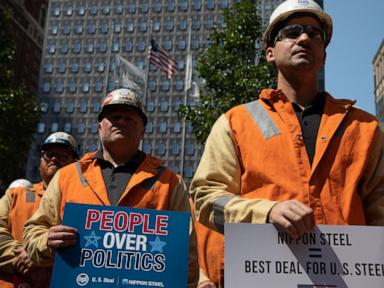The next gold rush is above us, not below us

The United States stands at a critical crossroads in space policy. While our space activities already generate over $380 billion annually and support 100,000 American jobs, we risk falling behind international competitors in the next great economic frontier. It's time to fundamentally reimagine our approach to space — not as a “government-led program,” but as America's next realm for economic expansion and industrial development.
The current NASA-centered approach, exemplified by the Artemis program, is both unsustainable and insufficient for maintaining American leadership in space. Already $100 billion over budget and years behind schedule, Artemis represents an outdated model of government-led space exploration that cannot compete with nimbler commercial alternatives or match the pace of international rivals like China.
Instead, our nation needs a bold new vision centered on enabling private enterprise to develop the economic potential of the Earth-Moon system. This means transitioning away from costly government systems, like the Space Launch System, in favor of partnerships with America's innovative new commercial space sector. By leveraging private industry's entrepreneurial drive and cost-effectiveness, we can dramatically accelerate progress while creating thousands of new jobs.
A key priority should be establishing a permanent human presence in low Earth orbit through commercial space stations. By tripling funding for NASA's Commercial LEO Destinations program and targeting two operational commercial stations by 2028, we can create new opportunities for in-space manufacturing, research and development. These orbital platforms will enable the production of novel pharmaceuticals, advanced materials and other high-value products that can only be made in microgravity.
Another priority should be space-based solar power demonstrations. Space-based solar power represents a transformative opportunity to achieve both energy independence and global energy leadership. By investing in multiple technology demonstrations by 2028 and developing a comprehensive strategy for industrial-scale power generation by 2035, America can pioneer an entirely new — and renewable — clean energy industry. This would not only enhance our national security but also position the U.S. to export reliable and continuous power to our allies around the world.
Achieving these ambitious goals requires modernizing our regulatory framework. The current system, designed for an earlier era of limited commercial space activity, has become a bottleneck for innovation. We must streamline licensing processes while maintaining public safety, starting with passing the Commercial Space Act of 2023. Additionally, elevating the Office of Space Commerce and reforming the Federal Aviation Administration's approach to commercial spaceflight regulation will help unlock private-sector investment and innovation.
Critics may argue that this vision privileges commercial interests over scientific exploration. The opposite is true. By reducing launch costs and expanding space infrastructure through market forces, we'll actually enable more scientific discovery than the traditional government-centric approach. Just as the transcontinental railroad enabled western exploration while driving economic growth, commercial space development will create new opportunities for scientific research while generating prosperity.
The geopolitical stakes could not be higher. China has made clear its ambition to control cislunar space and its vast resources. If America doesn't move quickly to establish a robust commercial presence beyond Earth, we risk ceding leadership in space to strategic competitors. This would have profound implications, not just for our economy and national security but for the future of human civilization in space.
History shows that technological and economic advancement in space drives innovation and creates solutions to terrestrial challenges, here on Earth, right now. NASA “spinoffs,” from communications satellites to GPS to weather forecasting technologies, have become fundamental to modern life. The next wave of space industrialization promises similar revolutionary benefits.
The choice before us is clear: we can continue with business as usual and watch other nations take the lead in space, or we can unleash American enterprise to drive the next great economic expansion.
By shifting from a government-centered to a market-oriented approach, streamlining regulations and making strategic investments in key capabilities like commercial space stations and space-based solar power, we can ensure American leadership in the high frontier.
The economic potential is vast, the technology is ready and our commercial space sector leads the world in innovation. All that's needed now is the political will to embrace a bold new vision of space as a realm for economic development and industrial growth. The nation that gains a first-mover advantage in developing space resources will shape the future of humanity. The United States must be that nation.
David Steitz served as NASA’s deputy associate administrator for Technology, Policy and Strategy and as the agency’s deputy chief technologist, retiring in 2022. Steitz now works as a technology policy and strategic communications consultant in Washington.
-

Biden blocks US Steel sale
Welcome to The Hill's Business & Economy newsletter {beacon} Business & Economy Business & Economy The Big Story Biden blocks US Steel sale President Biden has announced he will block the sale ...The Hill - 12h -

US Steel acquisition by Japan’s Nippon blocked
Domestic steel production is essential to U.S. security, Biden said.ABC News - 16h -

US health care reform: Why there are no easy fixes
While attention has been focused on the manner in which insurance companies handle claims, the broader issue is how the U.S. health system should be improved to serve the public interest.The Hill - 16h -

US leadership is being tested in Syria
The consequences of Turkey’s and its Islamist allies’ potential takeover of northeastern Syria are profound, with significant implications for U.S. national security interests.The Hill - 17h -

US Steel’s tortuous un-merger is a deal for the ages
Would-be acquirers prepare for era where big is no longer bad, but foreign still might beFinancial Times - 19h -

Biden expected to block $15bn takeover of US Steel
President set to kill Nippon Steel’s bid in one of his final acts in officeFinancial Times - 1d -

Here's a list of ISIS-inspired attacks in the US
The Pulse nightclub shooting in 2017 is the largest attack believe to be inspired by ISIS.The Hill - 1d -

Stormzy banned from driving for using mobile phone
An off-duty police officer caught him using a mobile phone behind the wheel of a Rolls-Royce.BBC News - 1d -

5 things that will shape US politics in 2025
The fallout of last month’s high-stakes election and recent battles within Congress are offering early clues of what will set the tone for politics in 2025. Democrats are looking to regroup from a ...The Hill - 2d
More from The Hill
-

Trump calls hush money case 'rigged charade' after judge sets sentencing date
President-elect Trump took to Truth Social to share his frustration after a judge set a Jan. 10 sentencing date in his New York hush money case, calling out a gag order which prevents him from ...The Hill - 6h -

Trump taps ex-Fox News contributor to join State department
President-elect Trump announced Friday that former Fox News contributor Tammy Bruce is slated to join his State Department later this month. “It is my great honor to announce that Tammy Bruce will ...The Hill - 6h -

GOP lawmaker warns of Johnson accountability for 'failures'
Rep. Scott Perry (R-Va.) raised concern with House Speaker Mike Johnson’s (R-La.) second stint as the Republican leader in the lower chamber despite his support of the incumbent on Friday. Perry ...The Hill - 6h -

Violent crime in DC at 30-year low
The U.S. Attorney’s Office for DC announced a 35 percent reduction in violent crime on Friday, touting the success of violence interruption programs and interventions from law enforcement. “The ...The Hill - 7h -

Authorities uncover more information on New Orleans attacker
{beacon} Welcome to The Hill's Defense & NatSec newsletter {beacon} Defense &National Security Defense &National Security The Big Story Authorities uncover more information on New Orleans ...The Hill - 7h
More in Politics
-

Trump calls hush money case 'rigged charade' after judge sets sentencing date
President-elect Trump took to Truth Social to share his frustration after a judge set a Jan. 10 sentencing date in his New York hush money case, calling out a gag order which prevents him from ...The Hill - 6h -

Trump taps ex-Fox News contributor to join State department
President-elect Trump announced Friday that former Fox News contributor Tammy Bruce is slated to join his State Department later this month. “It is my great honor to announce that Tammy Bruce will ...The Hill - 6h -

GOP lawmaker warns of Johnson accountability for 'failures'
Rep. Scott Perry (R-Va.) raised concern with House Speaker Mike Johnson’s (R-La.) second stint as the Republican leader in the lower chamber despite his support of the incumbent on Friday. Perry ...The Hill - 6h -

Violent crime in DC at 30-year low
The U.S. Attorney’s Office for DC announced a 35 percent reduction in violent crime on Friday, touting the success of violence interruption programs and interventions from law enforcement. “The ...The Hill - 7h -

Authorities uncover more information on New Orleans attacker
{beacon} Welcome to The Hill's Defense & NatSec newsletter {beacon} Defense &National Security Defense &National Security The Big Story Authorities uncover more information on New Orleans ...The Hill - 7h